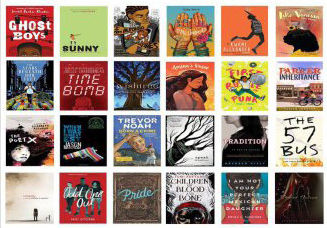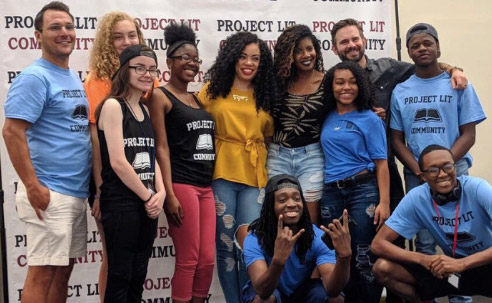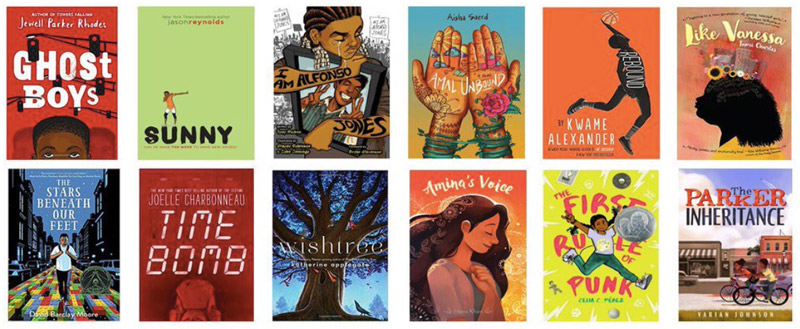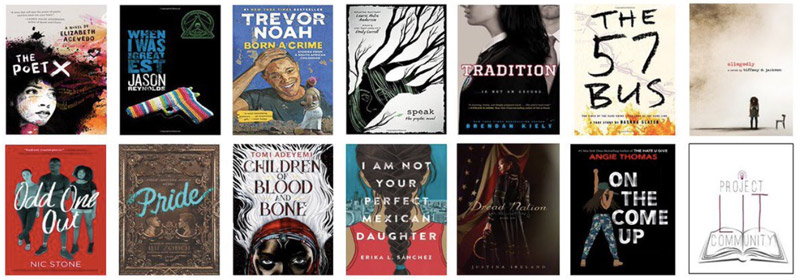Tips & Tricks
Suggested Reading: Project LIT Community's 2018-19 Selections

How can you inspire a lifelong love of reading in a community where access to books may be limited? And how can you engage young readers when the titles that are typically taught in schools don't always feel culturally relevant?
Many educators grapple with those questions, and when one teacher from Tennessee invited his students to address these challenges in their own community, their response sparked a grassroots literacy movement that's thriving in more than 40 states across the U.S.
Two summers ago, high school English teacher Jarred Amato came across an article on book deserts in The Atlantic. Amato, who teaches at Maplewood High School in East Nashville, recalls, "I immediately thought of our school so I went back to the classroom and asked our students, 'What can we do together to solve this problem?' My kids were fired up and we decided to do something about it."
The Project LIT (Libraries In The) Community was born.

Amato's students mobilized, collecting book donations and setting up LIT libraries around the city, which were built from newsstands donated by USA Today. But they soon realized that "just increasing access to books isn't the solution." Amato explains, "The books have to be meaningful and they have to be relevant and they have to be interesting if we're going to help kids fall in love with reading. And that's why our focus shifted more to engaging our community."
So the group began to host community-wide book clubs. Each of the more than 500 chapters approaches this a bit differently, but the main idea is to bring students together with adults in their communities to have meaningful discussions about what they're reading, what's going on in their lives, and what's happening in the world around them. The events are run by the students, who generate the discussion questions, handle the community outreach, and facilitate the discussions. The intention is to create a space of belonging that grows lifelong readers and future leaders.
Project LIT founder and Maplewood senior Rodrea had this to say about her experience:
Project LIT is something I can walk into and feel at peace. There are no worries, no drama, no negativity. Different races. Different languages. Different ages. It doesn't matter. All of us come together and have fun. We've developed a bond that cannot be broken. And when I graduate next year, I plan to start a Project LIT chapter at whatever college I decide to attend.
Fellow founding member and senior Jakaylia described it this way:
Being a part of Project LIT has given me the space and confidence to share my opinions with others and listen to what they have to say. It's helped me learn a lot about real-life issues and what we can do together to make a change. Project LIT Community is going to change thousands of lives. It has already changed mine.
This past July Project LIT hosted its first annual summit, attracting students and teachers from chapters across the U.S as well as critically acclaimed authors Kwame Alexander, Tiffany Jackson, Nic Stone, and Jeff Zentner. The event was a celebration of reading and community, as well as an opportunity to drum up excitement for the upcoming school year and all the great reading and discussions to come.

What will the Project LIT Community be reading in 2018-19? The group revealed its shortlists for Middle Grade and Young Adult readers in May after much deliberation on the part of students and chapter leaders. When asked about the process of winnowing the field to the final selections, Mr. Amato responded, "All books that we choose are reinforcing the idea that books are fun and that reading is worthwhile and enjoyable." Amato explained, "Project LIT books affirm and value our students' cultures and identities. They are high-quality, culturally relevant titles that promote empathy and kindness. They spark important, necessary conversations. They reflect our students' lived experiences and realities. They inspire our young people to write stories of their own. Put simply, they're great books, books that matter."
We're delighted to share the 2018-19 selections below, along with links to ready-made vocabulary lists based on these titles. Each list includes the most relevant vocabulary from the book, along with its context in the text. When students learn each word, they'll be exposed to its multiple definitions, subtle nuances, and various contexts so they fully understand it when they encounter it in their reading.
Project LIT Community's 2018-19 Middle Grade Selections

Rebound by Kwame Alexander
Wishtree by Katherine Applegate
Time Bomb by Joelle Charbonneau
Like Vanessa by Tami CharlesThe Parker Inheritance by Varian Johnson
Amina's Voice by Hena KhanI Am Alfonso Jones byTony Medina
The Stars Beneath Our Feet by David Barclay MooreThe First Rule of Punk by Celia Perez
Sunny by Jason ReynoldsGhost Boys by Jewell Parker Rhodes
Amal Unbound by Aisha SaeedProject LIT Community's 2018-19 Young Adult Titles

The Poet X by Elizabeth Acevedo
Children of Blood and Bone by Tomi Adeyemi
Speak: The Graphic Novel by Laurie Halse AndersonDread Nation by Justina Ireland
Allegedly by Tiffany JacksonTradition by Brendan Kiely
Born a Crime by Trevor NoahWhen I Was the Greatest by Jason Reynolds
I Am Not Your Perfect Mexican Daughter by Erika L. SanchezThe 57 Bus by Dashka Slater
Odd One Out by Nic StoneOn the Come Up by Angie Thomas
Pride by Ibi ZoboiFor more information on the ProjectLIT Community, check out them out on Twitter @ProjectLITComm and follow #ProjectLITBookClub. Jarred Amato also posts Project LIT news on his blog.
For more vocabulary resources based on middle grade and YA titles, search our list library.
